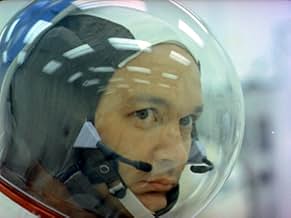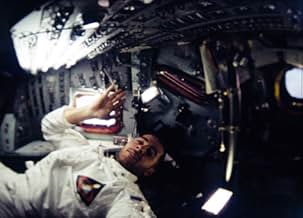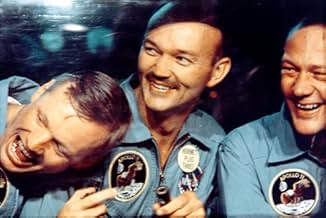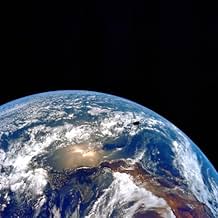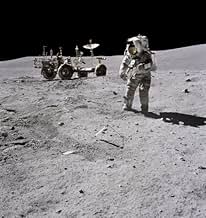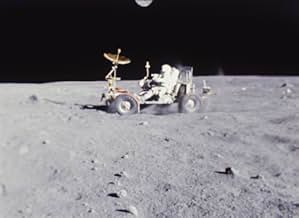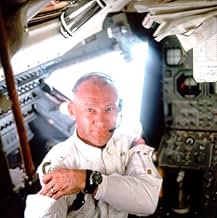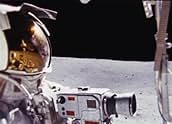NOTE IMDb
8,0/10
7 k
MA NOTE
Ajouter une intrigue dans votre langueThe crew members of NASA's Apollo missions tell their story in their own words.The crew members of NASA's Apollo missions tell their story in their own words.The crew members of NASA's Apollo missions tell their story in their own words.
- Récompenses
- 6 victoires et 13 nominations au total
Jim Lovell
- Self
- (as James Lovell)
Edgar D. Mitchell
- Self
- (as Edgar Mitchell)
Dave Scott
- Self
- (as David Scott)
William Anders
- Self
- (images d'archives)
Neil Armstrong
- Self
- (images d'archives)
Stephen Armstrong
- Self
- (images d'archives)
Viola Armstrong
- Self
- (images d'archives)
Jules Bergman
- Self
- (images d'archives)
Frank Borman
- Self
- (images d'archives)
Roger B. Chaffee
- Self
- (images d'archives)
Yuri Gagarin
- Self
- (images d'archives)
Avis à la une
10se7en187
I saw this at the Traverse City Film Festival and it was quite the thrill.
Another great documentary about the Apollo program and the astronauts that went to the moon. Some very interesting and inspiring interviews including incredible actual footage of the Apollo 11 mission as it traveled from the Earth to the Moon.
The film contains interviews from many of the astronauts, Mike Collins (the astronaut from Apollo 11 that didn't walk on the moon) was probably the highlight, he was so funny and entertaining. I was a little disappointed that Neil Armstrong wasn't interviewed, but oh well, it was still very good.
Captivating, fun, and an excellent score, I'm sure people will enjoy this well made film.
Another great documentary about the Apollo program and the astronauts that went to the moon. Some very interesting and inspiring interviews including incredible actual footage of the Apollo 11 mission as it traveled from the Earth to the Moon.
The film contains interviews from many of the astronauts, Mike Collins (the astronaut from Apollo 11 that didn't walk on the moon) was probably the highlight, he was so funny and entertaining. I was a little disappointed that Neil Armstrong wasn't interviewed, but oh well, it was still very good.
Captivating, fun, and an excellent score, I'm sure people will enjoy this well made film.
And I mean it. The footage and stories in this movie were like nothing I've ever seen. Nor have many others because this film includes new footage and stories of the Apollo space missions never seen nor heard. I went to an advance screening at the Sarasota Film Festival and I was extremely impressed as was the rest of the crowd. There was a very long standing ovation at the end of the movie. The film includes at least one member from each of the Apollo missions telling there stories of the process they went through while preparing to land on the moon. It contains the remarkable footage filmed by the crew members of each mission. If you truly want to be left see a movie that will leave you full of excitement and amaze you must see this movie. The host of the film said this film was the reason movies should be made and he was nothing short of the truth.
Saw this film at Sundance, the screening reserved for the Grand Jury World Documentary Award Winner. Wow! I have seen many of the preceding documentaries on the history of the American space program, the Apollo program in particular. Where this documentary exceeds all previous efforts was in revealing the humanity of the astronauts. Most other documentaries focus on the politics which motivated and technical hurdles overcome in the American space program. David Sington brilliantly uses only the astronauts voices for narration of facts and more with newly released footage from NASA, as well as a lot of footage we've all seen before. Because of the free rein given to the astronauts in the interviews, you see many sides of each revealed. For instance, Mike Collins (who has heretofore rarely been interviewed) reveals wonderful humor and joy in his accomplishments. You find out more about their worries and fears, how they look back on their work and what they were thinking at the time. They are all revealed as nice guys with whom you would want to spend an afternoon.
Strangely absent, but it works well in the end, was Armstrong. He gives virtually no interviews. In a way, having everyone else talk about him is maybe better than him talking.
And, the various conspiracy theories are dealt with in the end credits. This is a great place to do it. In films we sometimes see the end credits used for humorous out-takes, epilogue commentary, and so forth. By dealing with the conspiracy theories in an appended manner during the credits, the film refuses to elevate them to the level of legitimacy that the remainder of the facts and biographical material, yet still dismisses them. The single best dismissal is this: If it was all faked, why did they fake it so many times? Wouldn't once have been enough?
See this film when it comes to your neighborhood theater, as it has been announced as having a distribution deal. It is worth seeing on the big screen for its amazing visuals.
Strangely absent, but it works well in the end, was Armstrong. He gives virtually no interviews. In a way, having everyone else talk about him is maybe better than him talking.
And, the various conspiracy theories are dealt with in the end credits. This is a great place to do it. In films we sometimes see the end credits used for humorous out-takes, epilogue commentary, and so forth. By dealing with the conspiracy theories in an appended manner during the credits, the film refuses to elevate them to the level of legitimacy that the remainder of the facts and biographical material, yet still dismisses them. The single best dismissal is this: If it was all faked, why did they fake it so many times? Wouldn't once have been enough?
See this film when it comes to your neighborhood theater, as it has been announced as having a distribution deal. It is worth seeing on the big screen for its amazing visuals.
Bravo to everyone involved in this great film. I just caught it at the 16th Philadelphia Film Festival. Director David Sington answered questions eloquently and patiently as I sat stunned after the film. Having read every Apollo astronaut biography I know to exist I didn't think I'd learn much in the way of facts from the movie, but it turns out there were a couple of things. It is great to see these men who gave so much to my generation talking about the experience decades later. They are wiser and gentler people than when they flew the spacecraft. Sington stated that he wanted to show the events from the point of view of the astronauts. He succeeds, and the experience is moving and meaningful to everyone who looked out from this world in a state of wonder. The Apollo program remains something similar to Leonardo's sketch of a helicopter--an idea ahead of its time technologically, politically and economically, here at the very start of humanity's adventure in the Universe, only a few thousand years after we started using agriculture and so on. When future generations wonder what was going on during the Apollo decade I think this movie is one of the things they'll be looking at.
I don't admit this to too many people, but the single most significant historic event I have ever "witnessed," was watching the first lunar landing as it happened, on television, as a ten year old kid. Okay, maybe there was a thirteen-second delay, but I was right there with those guys-- my heart pounding, skipping a beat every time Uncle Walter (a.k.a. Walter Cronkite, the most trusted man in America) interjected his incomparably eloquent journalistic commentary. But even Cronkite couldn't suppress his awe as mankind's greatest achievement unfolded before our eyes.
The documentary, "In the Shadow of the Moon," directed by David Sington, and presented by Ron Howard (who partnered with ThinkFilm to help usher the project to completion), is not only a romantic, dramatic, suspense-filled fantasy to behold, it grips you with deep emotion and vests you with our heroes through every sequence of their quest. And it's all real.
Without a single frame of CGI or simulation, the filmmakers compiled astounding, never-before seen footage with inserts of intimate confessions by some of the remaining Apollo crew members who took part in the nine moon landings. "Shadow" shows just part of how the work of 400,000 scientists and engineers came together to make President Kennedy's dream of putting a man on the moon by the end of the decade, a reality. These are parts worth seeing.
"The extraterrestrial film footage, shot by the astronauts themselves, has been brought out of storage only a handful of times since the sixties and seventies," Chris Riley, the film's co-producer explains. Considering that there may not be any more footage shot on or from the moon by an actual human, again in our lifetime, this film is very precious indeed.
"In the Shadow of the Moon" effectively evokes that brief time in late-20th century America when we thought that the government was doing something right. This documentary puts a human face-- and soul-- into those bulky space suits, and let's us know what it was really like to be on those harrowing missions.
Command module pilot Michael Collins admits to having being excited, but not fearful. At times, mostly worried-- that all the machinery would work as planned. The documentary reveals a few of those times the machines didn't, or almost didn't work. And startlingly, how much "luck" played a part in the operations. "Shadow" nearly gives us a first-person experience of how a body feels, what the physical sensations of being shaken, slammed, and thrust-- first off the ground, then through the atmosphere, finally into the eerie calm and quiet of space. The men talk of how they felt a fool's complacency, if only for a second, after a rocket stage would break away and fall to earth, until anticipation of the next stage's violent expulsion reminded them that it too, would detach as planned, or explode killing them all. It makes the Space Mountain ride at DisneyWorld sound like a massage.
Although Neil Armstrong, known to be somewhat of a recluse, does not make an appearance, he is certainly there in spirit. His fellow crew members make it known they felt he was the right choice for the first man out. That he was preternaturally calm under pressure, they concur. Recollecting how Armstrong delivered those poignant first words as he descended the steps of the LEM, and how it might have been more tempting for them to simply yell, "Whoopee! I did it!" But Buzz Aldrin asserts that he also holds a record for a lunar first. In one of the many hilarious moments in the film, his feat is captured on video as proof.
Most of the men who went on the Apollo moon missions tell in this film, of the moment while in space, viewing the galaxy from a perspective very few of us will ever see, they experienced the profound realization of their own insignificance, while comforted with a certainty of infinite connectivity with the very stuff of the universe. Contrast that with the "hero's parades" and instant celebrity into which they were violently thrust upon return to terra firma. Additionally, some of the astronauts confess the guilt they felt, knowing that many of the pilots and friends they had trained and served with, were being "shot at, shot down, and were fighting for their country" in Viet Nam.
Some might have viewed America's race to the moon was little more than a diversion, cleverly orchestrated by government propagandists, from the colossal turmoil of the times. Others, saw it as a symbol of hope-- that there was something greater beyond our mere earthly squabbles.
Watching this film reminded me of what America is capable-- how much can be accomplished in the interest of science, ecology, or the most human of natures, curiosity-- not to be underrated. Present and future resources, research, and funding if thoughtfully channeled, just might be able to find alternate sources of energy, cure cancer, and save the planet from ecological disaster.
President Kennedy foresaw that the way out of the Post-War confusion and the Cold War paranoia, was to coach us back to the top of our game. Just a few years before what would eventually become the debacle of Viet Nam, this was perhaps one of the last times America truly was champion of the world. Getting to the moon made us feel like winners. We were proud. I still am.
The documentary, "In the Shadow of the Moon," directed by David Sington, and presented by Ron Howard (who partnered with ThinkFilm to help usher the project to completion), is not only a romantic, dramatic, suspense-filled fantasy to behold, it grips you with deep emotion and vests you with our heroes through every sequence of their quest. And it's all real.
Without a single frame of CGI or simulation, the filmmakers compiled astounding, never-before seen footage with inserts of intimate confessions by some of the remaining Apollo crew members who took part in the nine moon landings. "Shadow" shows just part of how the work of 400,000 scientists and engineers came together to make President Kennedy's dream of putting a man on the moon by the end of the decade, a reality. These are parts worth seeing.
"The extraterrestrial film footage, shot by the astronauts themselves, has been brought out of storage only a handful of times since the sixties and seventies," Chris Riley, the film's co-producer explains. Considering that there may not be any more footage shot on or from the moon by an actual human, again in our lifetime, this film is very precious indeed.
"In the Shadow of the Moon" effectively evokes that brief time in late-20th century America when we thought that the government was doing something right. This documentary puts a human face-- and soul-- into those bulky space suits, and let's us know what it was really like to be on those harrowing missions.
Command module pilot Michael Collins admits to having being excited, but not fearful. At times, mostly worried-- that all the machinery would work as planned. The documentary reveals a few of those times the machines didn't, or almost didn't work. And startlingly, how much "luck" played a part in the operations. "Shadow" nearly gives us a first-person experience of how a body feels, what the physical sensations of being shaken, slammed, and thrust-- first off the ground, then through the atmosphere, finally into the eerie calm and quiet of space. The men talk of how they felt a fool's complacency, if only for a second, after a rocket stage would break away and fall to earth, until anticipation of the next stage's violent expulsion reminded them that it too, would detach as planned, or explode killing them all. It makes the Space Mountain ride at DisneyWorld sound like a massage.
Although Neil Armstrong, known to be somewhat of a recluse, does not make an appearance, he is certainly there in spirit. His fellow crew members make it known they felt he was the right choice for the first man out. That he was preternaturally calm under pressure, they concur. Recollecting how Armstrong delivered those poignant first words as he descended the steps of the LEM, and how it might have been more tempting for them to simply yell, "Whoopee! I did it!" But Buzz Aldrin asserts that he also holds a record for a lunar first. In one of the many hilarious moments in the film, his feat is captured on video as proof.
Most of the men who went on the Apollo moon missions tell in this film, of the moment while in space, viewing the galaxy from a perspective very few of us will ever see, they experienced the profound realization of their own insignificance, while comforted with a certainty of infinite connectivity with the very stuff of the universe. Contrast that with the "hero's parades" and instant celebrity into which they were violently thrust upon return to terra firma. Additionally, some of the astronauts confess the guilt they felt, knowing that many of the pilots and friends they had trained and served with, were being "shot at, shot down, and were fighting for their country" in Viet Nam.
Some might have viewed America's race to the moon was little more than a diversion, cleverly orchestrated by government propagandists, from the colossal turmoil of the times. Others, saw it as a symbol of hope-- that there was something greater beyond our mere earthly squabbles.
Watching this film reminded me of what America is capable-- how much can be accomplished in the interest of science, ecology, or the most human of natures, curiosity-- not to be underrated. Present and future resources, research, and funding if thoughtfully channeled, just might be able to find alternate sources of energy, cure cancer, and save the planet from ecological disaster.
President Kennedy foresaw that the way out of the Post-War confusion and the Cold War paranoia, was to coach us back to the top of our game. Just a few years before what would eventually become the debacle of Viet Nam, this was perhaps one of the last times America truly was champion of the world. Getting to the moon made us feel like winners. We were proud. I still am.
Le saviez-vous
- AnecdotesOf all the astronauts who appeared in the film, only Buzz Aldrin demanded to be paid.
- GaffesThe 1202 alarm was not a programming error in the Apollo Guidance Computer, but rather a hardware design bug, already documented by Apollo 5 engineers. Since the 1202 alarm had occurred only once during testing, NASA decided to go with the radar hardware with known problems instead of using untested newer alternatives with unknown problems.
- Citations
Jim Lovell: We changed our plans on Apollo 8. They changed the mission from an Earth orbital type to a flight to the Moon. And it was a bold move. It had some risky aspects to it. But it was a time when we made bold moves.
- ConnexionsAlternate-language version of Universum: Im Schatten des Mondes (2009)
Meilleurs choix
Connectez-vous pour évaluer et suivre la liste de favoris afin de recevoir des recommandations personnalisées
Détails
- Date de sortie
- Pays d’origine
- Sites officiels
- Langues
- Aussi connu sous le nom de
- In the Shadow of the Moon
- Sociétés de production
- Voir plus de crédits d'entreprise sur IMDbPro
Box-office
- Budget
- 2 000 000 $US (estimé)
- Montant brut aux États-Unis et au Canada
- 1 134 358 $US
- Week-end de sortie aux États-Unis et au Canada
- 38 281 $US
- 9 sept. 2007
- Montant brut mondial
- 2 161 369 $US
- Durée1 heure 40 minutes
- Couleur
- Mixage
- Rapport de forme
- 1.85 : 1
Contribuer à cette page
Suggérer une modification ou ajouter du contenu manquant

Lacune principale
By what name was Dans l'ombre de la lune (2007) officially released in India in English?
Répondre





